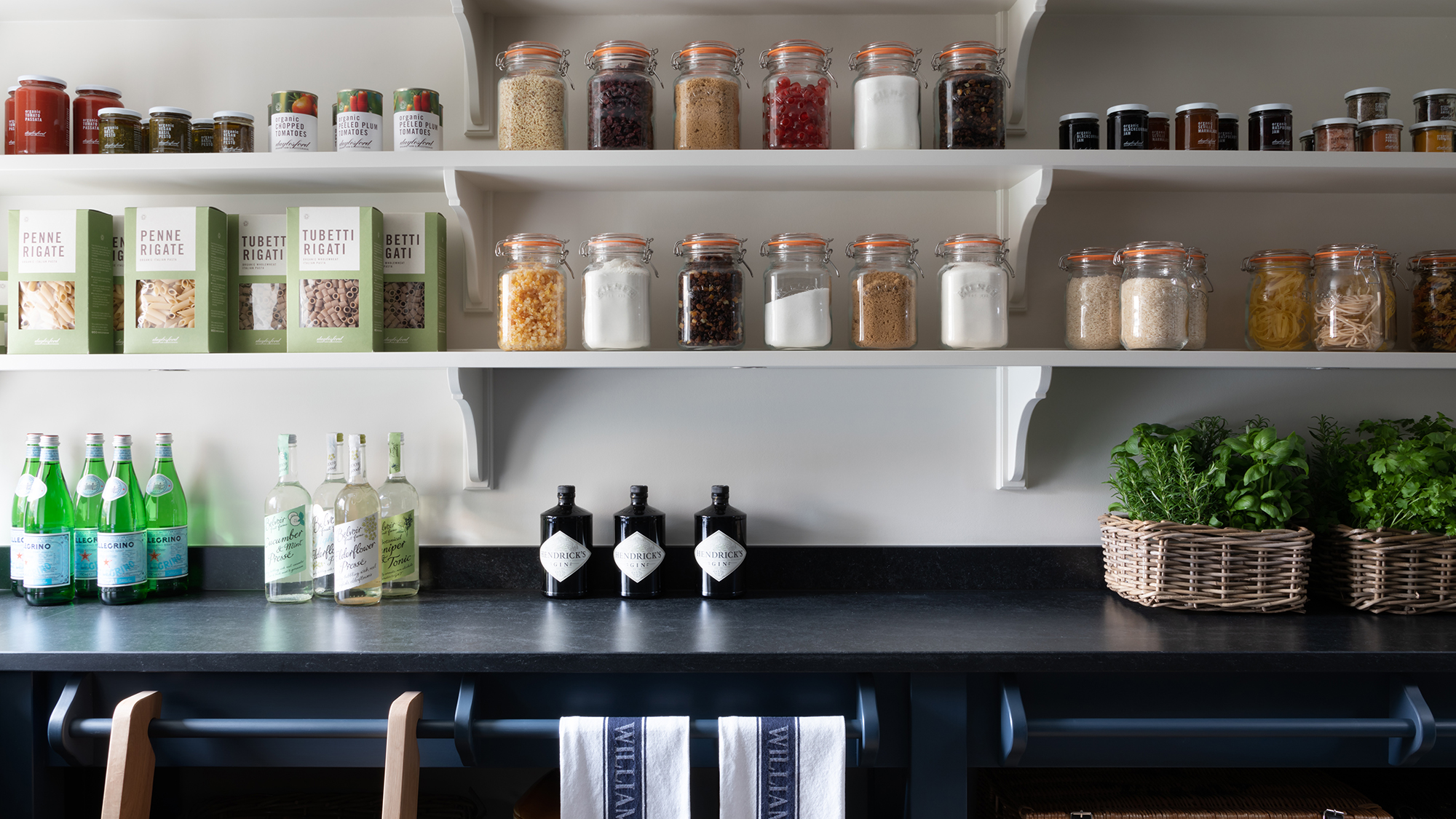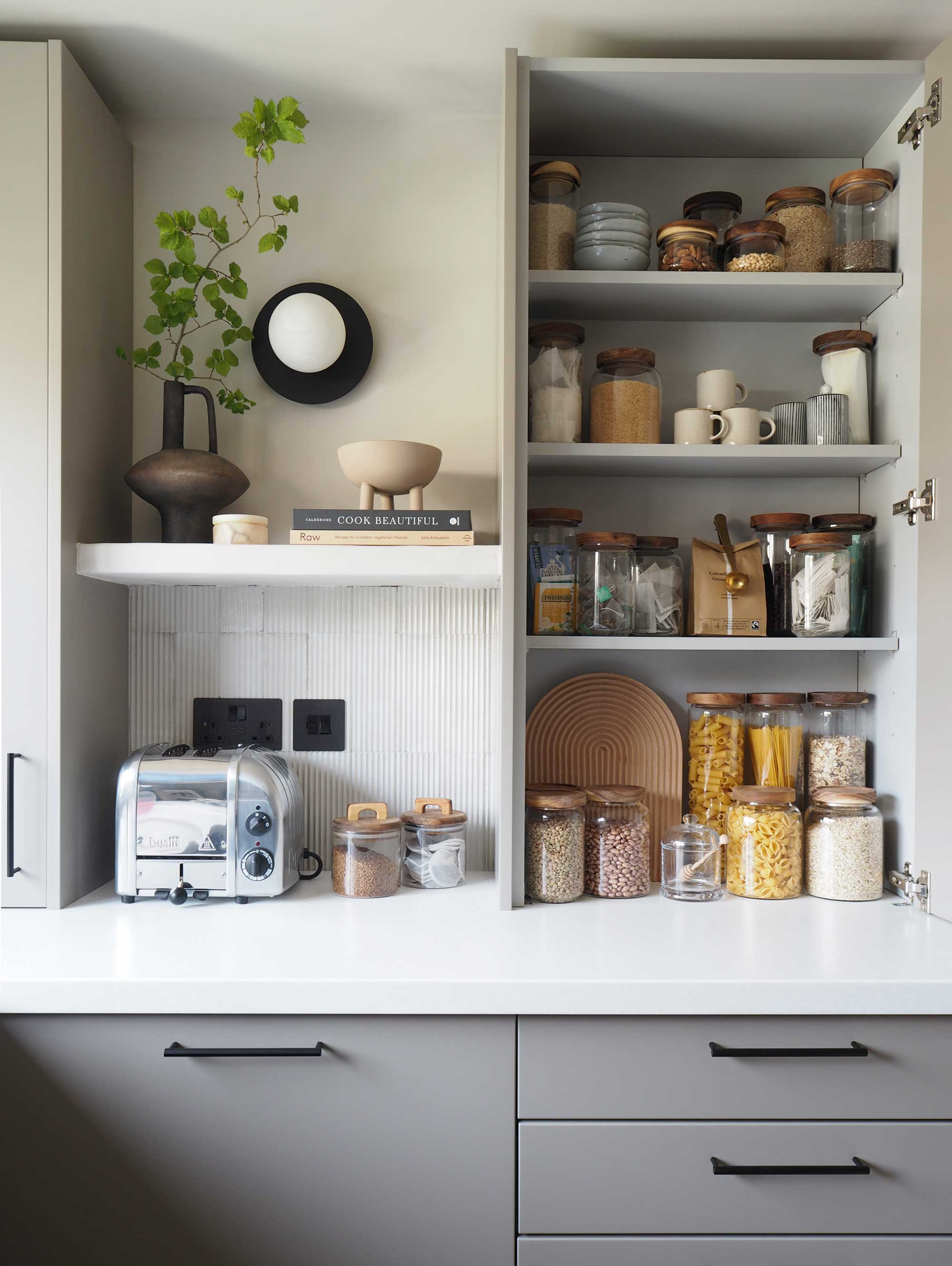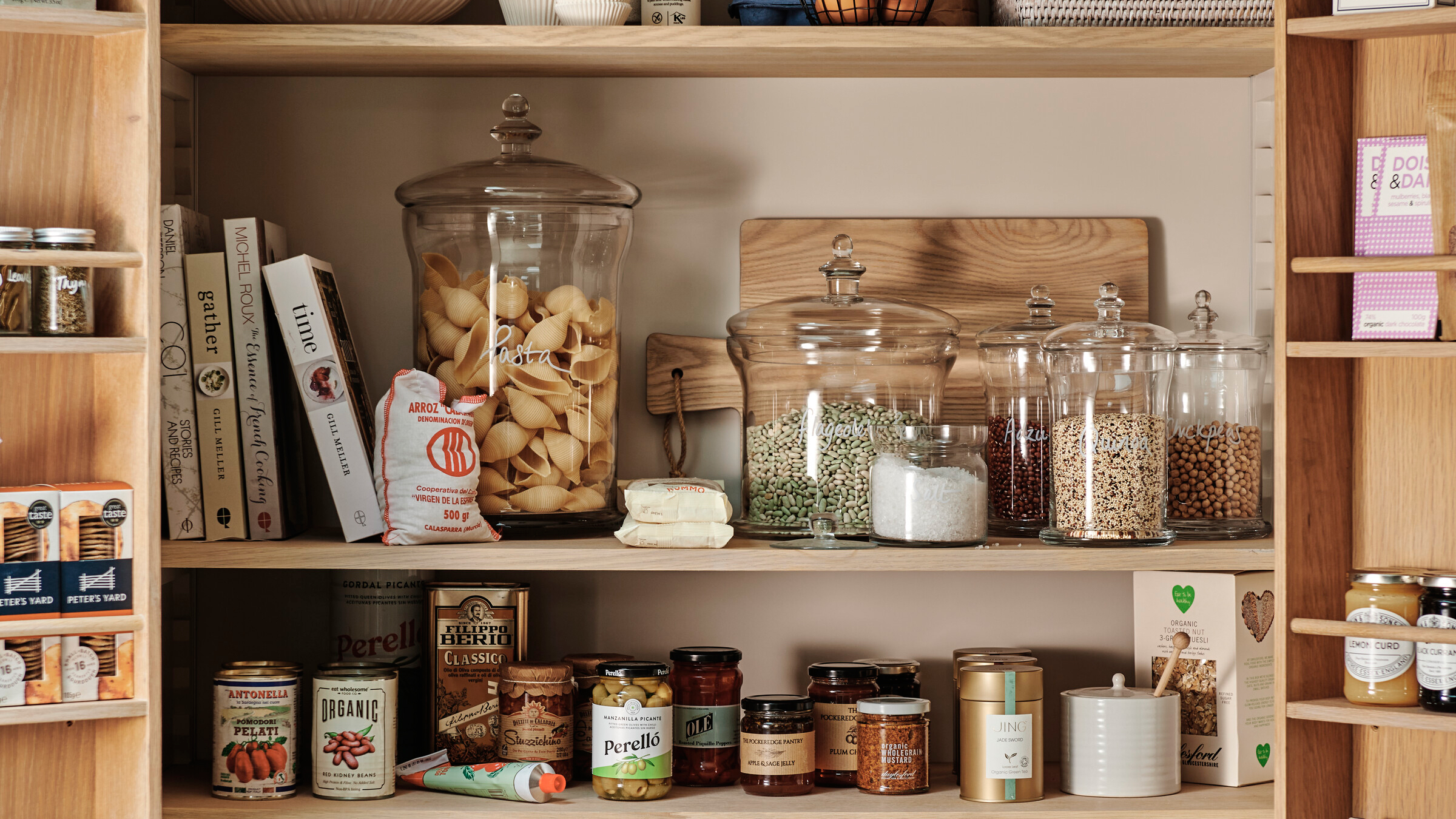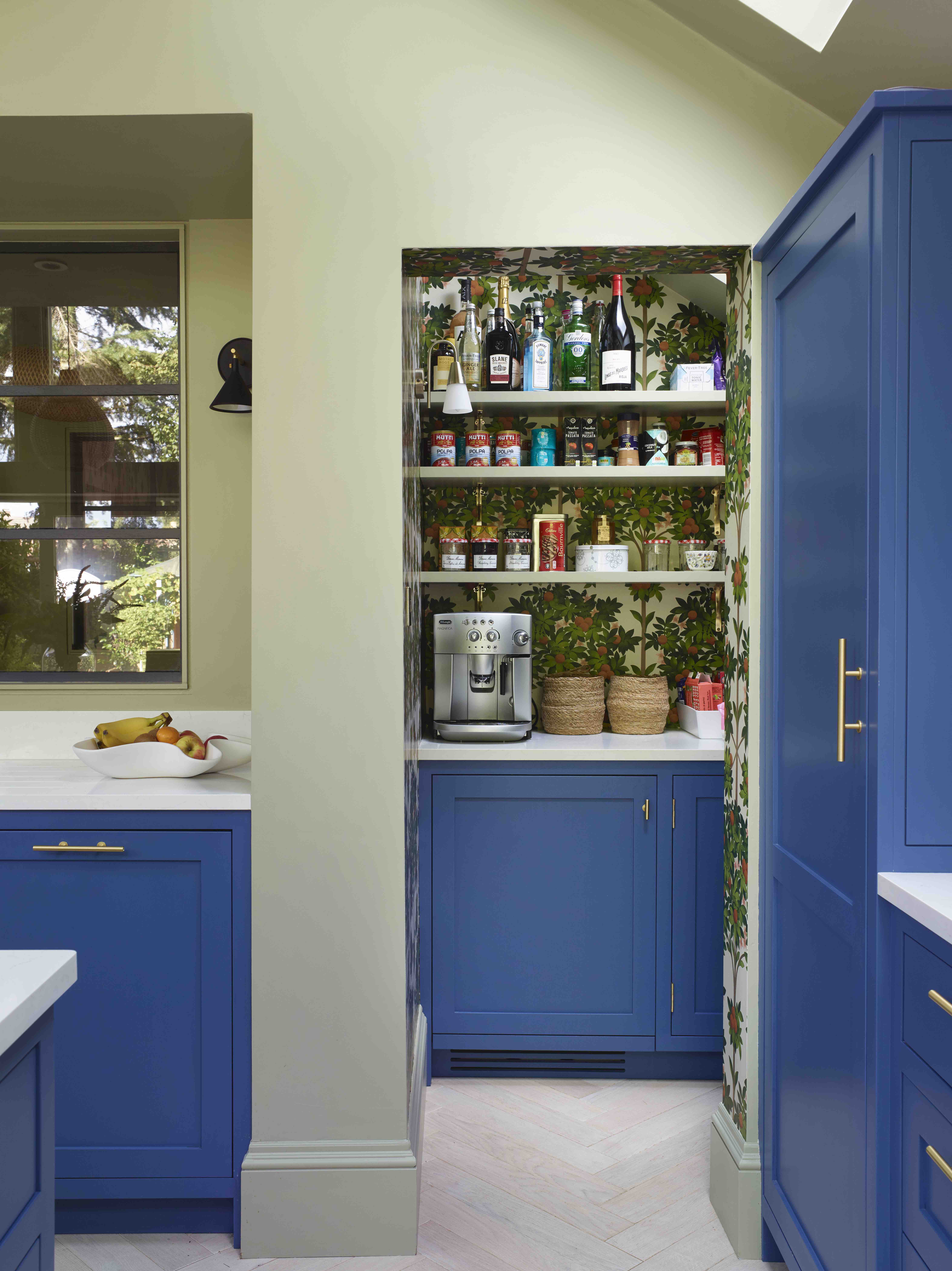
A super-organized pantry has been a bit of a trend in recent years, but while decanting your food into uniform containers can look seriously satisfying, professionals say we can take it a step too far.
If, like me, you've been influenced to decant every item in your kitchen into super sleek glass jars with individual labels, be our guest, but it turns out that some items are better left alone. A well-organized pantry with decanted dry foods might look beautiful, but it could be a waste of time - or worse - impact the quality of your food if you decant the wrong ones. What's more, while decanting can be used to keep food fresher for longer, it can also be an extra chore that then makes frequently used items a pain to get to.
In the name of creating the most gorgeous and functional kitchen possible, we set out to find out the rules when it comes to decanting. We spoke with professional organizers who revealed three items you should always decant and three you can skip for the freshest food and most organized pantry possible.
Items to decant

1. Large bagged goods
The big appeal of decanting pantry items is the chance to get rid of bulky and ugly packaging. The highly uniform and thematic pantry look is probably all over your inspiration board, and for top-level pantry organization, the professionals still recommend decanting your large bagged food and cardboard-packaged products.
'I would always recommend decanting food in large bags,' says professional organizer, Sara Bereika of Sara Jane Organizing. Items such as rice, pasta, and legumes are often bought in bulk, therefore decanting them provides a more practical storage solution than the big bags they are sold in. This allows you to store a limited amount in a practical place while keeping the bulk of it in a high cupboard for future use.
Cardboard boxes are one of the most inefficient ways to store food, taking up valuable space and not providing air-tight protection. 'Do not store food in cardboard containers,' urges Amy Bloomer from Let Your Space Bloom organizing service. 'They take up too much room and also attract pests.' This means items such as cereal and pasta will benefit from being kept in secure and easy-to-use containers.
2. Frequently used items

Food items that you reach for frequently while cooking in the kitchen should always be decanted for ease of accessibility. 'Decanting should make life easier,' says Lisa Ruff, a professional organizer at the Neat Method. 'Be sure to select items that you won't have to constantly replenish and don't decant more items than you are willing to keep up with.'
Flour is one item that benefits from being decanted into a proper container. 'One of the first things we always suggest decanting are baking staples,' says Lisa. 'These packages rarely get used all at once and are typically impossible to reseal. Bags of flour and sugar are also much easier and less messy to access with a wide-mouth canister or jar.'
Home organizing should always focus on making your life easier, which means there's no exhaustive list of things you should decant. If you use a specific item every day and its original packaging is a pain, decant it! Do whatever works best for you and your situation.
3. Foods that need preserving for freshness
While we might be more drawn to the aesthetic beauty, the main premise behind decanting food items is to preserve freshness. When it comes to how to organize a pantry, remember it's this practical element that makes organizing and decanting a worthwhile task in the first place.
Decanting food can keep it fresher for longer, ultimately leading to less food waste and meaning better quality food on your table. Consider what food products you complain about going stale as these would be the best ones to decant. For example, items such as granola and cereal really benefit from an airtight container that keeps the crunch up until the last bite.
Items that aren't worth decanting

1. Foods with good packaging
If you frequently buy something that has good sturdy packaging that keeps your food fresh, there's no point in decanting it. 'Items already in good packaging don't require decanting,' says Sara. 'If a food item is in a resealable plastic bag, for example, there's no need to decant it. The packaging it comes in is often sufficient.'
Organizers often urge us to only create habits we can stick to. Being realistic about what you do and don't need to decant is an essential part of your food storage and pantry layout, so don't create more work for yourself than necessary. Whilst having a Kardashian-approved walk-in pantry stacked with identical glass jars and woven baskets is visually appealing, it's not necessary and, for most of us, it's unrealistic.
2. Foods that are used quickly

'Items that you cycle through very quickly aren't worth decanting,' says Kirsten Fisher founder of Imagine Home Organization. 'If you eat the package in a single sitting, these are not items you should decant!' Not only will it leave your container frequently empty, which is worse than having ugly packaging temporarily on your shelf, but it will simply be a waste of time.
'Decanting is all about determining what level of service you can maintain,' she says. 'Remember, the organization's purpose is to make life easier - not give you extra projects to do each day or week!' These wise words are essential to stand by if you are serious about creating an organized kitchen.
3. Items that go stale quickly
When it comes to pantry storage, some items are actually best kept in their original containers where freshness is in question. 'Chips, crackers, and popped popcorn get stale even in an airtight container,' says Kristen. Moreover, they're often the type of food that's consumed quickly or in one sitting, meaning there's little need to decant them anyway.
In this case, the best option is to keep them in their original packaging. 'Snacks are better kept fresh with a bag clip and then bags are put in a container keeping them neatly together,' Kristen advises. We love woven storage baskets like this one from Target for this as they look beautiful on your shelves while hiding the mess of packets inside.
While this is by no means an exhaustive list, applying these general rules to your decanting habits could result in fresher food, more organized food storage, and the most beautiful pantry you've ever seen. Happy decanting!







